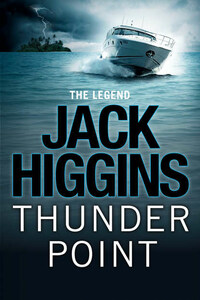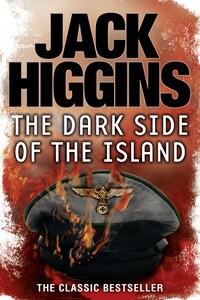Harper
An imprint of
HarperCollinsPublishers
1 London Bridge Street,
London SE1 9GF
www.harpercollins.co.uk
First published in Great Britain by Michael Joseph Ltd 1993
Copyright © Jack Higgins 1993
Jack Higgins asserts the moral right to be identified as the author of this work
A catalogue record for this book is available from the British Library
This novel is entirely a work of fiction. The names, characters and incidents portrayed in it are the work of the authorâs imagination. Any resemblance to actual persons, living or dead, events or localities is entirely coincidental.
This is a work of fiction. Names, characters, places, and incidents either are the products of the authorâs imagination or are used fictitiously. Any resemblance to actual events, locales, organizations, or persons, living or dead, is entirely coincidental and beyond the intent of either the author or the publisher.
All rights reserved under International Copyright Conventions. By payment of the required fees, you have been granted the non-exclusive, non-transferable right to access and read the text of this e-book on-screen. No part of this text may be reproduced, transmitted, down-loaded, decompiled, reverse engineered, or stored in or introduced into any information storage and retrieval system, in any form or by any means, whether electronic or mechanical, now known or hereinafter invented, without the express written permission of HarperCollins e-books.
Source ISBN: 9780007456058
Ebook Edition © June 2012 ISBN: 9780007456055 Version: 2015-01-13
Whether Reichsleiter Martin Bormann, Head of the Nazi Party Chancellery and Secretary to Adolf Hitler, the most powerful man in Germany after the Führer, actually escaped from the Führer Bunker in Berlin in the early hours of 2 May 1945 or died trying to cross the Weidendammer Bridge has always been a matter of conjecture. Josef Stalin believed him to be alive, Jacob Glas, Bormannâs chauffeur, swore that he saw him in Munich after the war and Eichmann told the Israelis he was still alive in 1960. Simon Wiesenthal, the greatest Nazi hunter of them all, always insisted he was alive and then there was a Spaniard who had served in the German SS who insisted that Bormann had left Norway in a U-boat bound for South America at the very end of the warâ¦
30 April 1945
The city seemed to be on fire, a kind of hell on earth, the ground shaking as shells exploded and, as dawn came, smoke drifted in a black pall. In the eastern half of Berlin, the Russians were already formally in control, and refugees, carrying what they could of their belongings, moved along Wilhelmstrasse close to the Reich Chancellery in the desperate hope of somehow reaching the West and the Americans.
Berlin was doomed, everyone knew that, and the panic was dreadful to see. Close by the Chancellery, a group of SS were stopping everyone they saw in uniform. Unless such individuals could account for themselves they were immediately accused of desertion in the face of the enemy and hung from the nearest lamppost or tree. A shell screamed in, fired at random by Russian artillery. There were cries of alarm and people scattered.
The Chancellery itself was battered and defaced by the bombardment, particularly at the rear, but deep in the earth, protected by thirty metres of concrete, the Führer and his staff still worked on in a subterranean world that was totally self-supporting, still in touch by radio and radio-telephone with the outside world.
The rear of the Reich Chancellery was also damaged, pock-marked by shell fire, and the once-lovely gardens were a wilderness of uprooted trees and the occasional shell hole. One blessing; there was little air activity, low cloud and driving rain having cleared the sky of aircraft for the moment.
The man who walked in that ruined garden on his own seemed curiously indifferent to what was happening, didnât even flinch when another shell landed on the far side of the Chancellery. As the rain increased in force, he simply turned up his collar, lit a cigarette and held it in cupped hand as he continued to walk.
He was not very tall with heavy shoulders and a coarse face. In a crowd of labourers or dock workers he would have faded into the background, nothing special, not memorable to the slightest degree. Everything about him was nondescript from the shabby ankle-length greatcoat to the battered peaked cap.
A nobody of any importance, that would have been the conclusion and yet this man was Reichsleiter Martin Bormann, Head of the Nazi Party Chancellery and Secretary to the Führer, the most powerful man in Germany next to Hitler himself. The vast majority of the German people had never even heard of him and even fewer would have recognized him if they saw him. But then he had organized his life that way, deliberately choosing to be an anonymous figure wielding his power only from the shadows.














